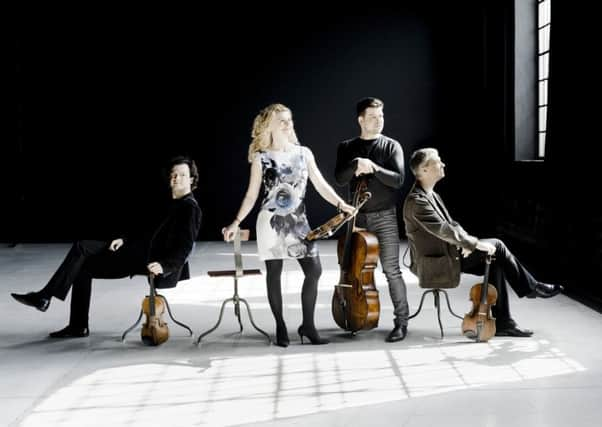Classical review: Eask Neuk Festival, Crail Community Hall


EAST NEUK FESTIVAL
Christian Zacharias & Calidore Quartet / Calidore Quartet & Julian Steckel / Memorial Ground / Pavel Haas Quartet & Christian Zacharias | Rating: **** | Crail Community Hall
On Friday in Crail Church, German pianist Christian Zacharias invited us into the fantasy world of the mentally volatile Robert Schumann. The trick with such works as the Phantasiestücke Op111 and the collective mood pieces of Kreisleriana is to create order out of potential chaos.
Advertisement
Hide AdAdvertisement
Hide AdThis was nostalgia-free Schumann, like an old master cleaned of accumulated grime to reveal newly distinct colours. Zacharias’s insightful performances – if occasionally depersonalised,– had an unyielding cerebral clarity.
In the second half, the young Calidore Quartet, took us on a calmer journey, negotiating Mendelssohn’s String Quartet, Op40 No1, with nuanced simplicity. They allowed their own collective personality – an ensemble driven more by tonal consensus than a seething recipe of divergent ingredients – to express Mendelssohn’s seamless, silken writing with honest musicality.
But it was in Saturday’s morning concert, in a sun-filled Kilrenny Church, that the Calidore exhibited the full extent of their expressive armoury. In Mendelssohn’s early Op12 Quartet, and in the final, tormented Op80, they unleashed a sunburst of emotions, from the capricious delicacy of the Op12 Cazonetta to the whirlwind apotheosis and subsiding calm of the later work. This is an ensemble as capable of whipping up storms as enchanting us with breathless moments of utter magic.
Between the two Mendelssohn works, cellist Julian Steckel tackled the third of Bach’s unaccompanied Suites for solo cello. It was a robust reading, poeticised by Steckel’s judicious rubato, but just occasionally spilling over into mannered, heavy-handedness.
The afternoon storm clouds cast an unintentional spell on Saturday’s major festival commission, emptying over Cambo estate and rat-tat-tatting off the Cambo Barn roof like machine gun fire. They provided a poignant accompaniment to David Lang’s choral project, Memorial Ground, co-commissioned by 14-18 NOW, and celebrating the memory of the Somme.
Designed to combine professional and amateur singers, and set against a backdrop of stacked potato crates, as if alluding to the makeshift world of the trenches, this performance featured Paul Hillier’s Theatre of Voices alongside members of the Scottish Chamber Orchestra Chorus, St Andrews Chorus, Anstruther Philharmonic Society, and pupils of nearby Waid Academy, with tolling instrumental underscore of tubular bell, horn and double bass all under Hillier’s baton.
Simplicity is its key. A ritualistic repeated hymn to Lang’s staccato text, forming the backbone of the work, was first intoned by the professional ensemble, who gradually circulated separately around the audience. With each repeat, more singers broke ranks filling the auditorium with a cacophonous counterpoint of aphoristic contents contributed by respondents to the pre-festival public appeal.
Advertisement
Hide AdAdvertisement
Hide AdThere were moments to savour, fuelled by a lead-up to this choreographed finale that featured a valiant SCO Chorus (under Gregory Batsleer) in Parry’s Songs of Farewell, and the extraordinary Alec Frank-Gemmill in James MacMillan’s Motet V for solo horn. But this repetitive post-minimalist DIY concept can defeat its own ends by overstaying its welcome. Future performances would do well to apply rigorous editing.
Saturday night, back in Crail, saw the return of Zacharias, this time in collaboration with the Pavel Hass Quartet. He opened with a melancholic selection of Chopin Mazurkas, and found a warmer, more affectionate poeticism than in the previous night’s Schumann. The Czech Quartet continued the nostalgia theme with Dvorak’s American Quartet.
They are a different species from the Calidore, more openly passionate, with astonishing telepathy, yet not always so consistent as a tonal entity. The Dvorak lacked overall focus, but they and Zacharias found natural, free flowing empathy in Schumann’s bright and wholesome Piano Quintet – German music, with a Bohemian twist enthralling a British audience. How positively European.